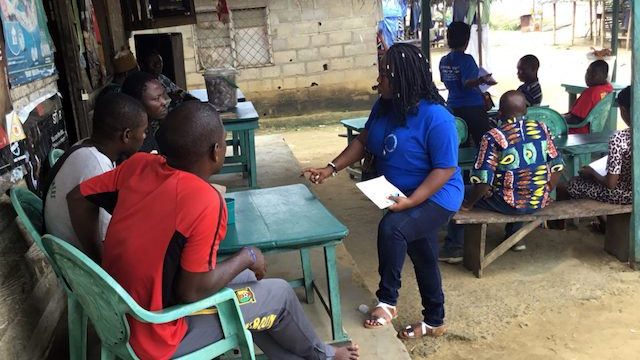Francisca Awah Mbuli and her team go door to door in Cameroon, warning young women about trusting members of the community who promise them well-paid jobs abroad.
She pulls out her phone to show how she was forced into domestic servitude in Kuwait. A person from her own neighborhood had promised her a teaching job in Kuwait, where she would earn $1000 a month.
Related Campaign: Show respect for survivors’ stories and dignity.
Yet, upon arrival she was taken to be a domestic worker for a Kuwaiti family, unpaid for her work and sexually abused by the father of the family.
It was only after she fled to the embassy of the Central African Republic in Kuwait and got help from non-profit Freedom For All that she was able to return to Cameroon.
PBS reports:
Traffickers tend to be people these women trust, like pastors in the community or even their relatives, she said. “I lived in the same neighborhood as my trafficker. We grew up together. … He used my vulnerability as a path to get to me.”
Mbuli said her own experience being trafficked is what led her to start her organization. She launched the Survivors’ Network in 2016 to spread awareness about human trafficking, rescue women from abusive situations, and reintegrate women who have been trafficked back into society. The organization is led and run by other survivors of human trafficking.
“It’s a lot of talking, counseling, convincing them. Because I can’t just tell someone not to travel to a country,” Mbuli said. “But I can share my story, I can tell them what went wrong with the others, and with me.”
Most important, Mbuli said, is giving women a reason to stay in Cameroon. “That’s why I always go back to the point of empowerment. They need something promising back home,” she said.
Survivors’ Network has launched a microfinance program, providing seed capital to women to start their own businesses. So far it has helped 19 business projects get off the ground, including a thrift shop, beauty salon, and a broiler bird poultry farm.
This year Mbuli’s efforts even received recognition in this year’s US Trafficking in Persons report. While the US TIP report upgraded Cameroon from Tier 3 to Tier 2 this year, Mbuli said the Cameroonian government has much more it can do to combat human trafficking, especially among the country’s internally displaced persons (IDPs).
“There is so much more work to be done,” she said. “But the first step is awareness. Speak to the people around you, try to educate everyone you know about the risks of trafficking.”
Take Action: Chip in to support our work against human trafficking.







Freedom United is interested in hearing from our community and welcomes relevant, informed comments, advice, and insights that advance the conversation around our campaigns and advocacy. We value inclusivity and respect within our community. To be approved, your comments should be civil.